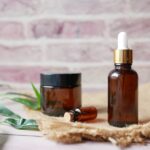Essential oils are highly concentrated plant extracts that capture the natural fragrance and beneficial properties of plants. They are derived from various parts of plants, including flowers, leaves, stems, bark, and roots. These oils are obtained through a process called distillation, which involves steaming or pressing the plant material to release its aromatic compounds.
The uses of essential oils are vast and diverse. They are commonly used in aromatherapy, which is the practice of using scents to promote physical and emotional well-being. Essential oils can also be found in personal care products, cleaning products, and even in cooking. Their popularity has grown in recent years due to their natural origins and potential health benefits.
The history of essential oils: A brief overview
The use of essential oils dates back thousands of years. The ancient Egyptians were known to use essential oils for medicinal and cosmetic purposes. They used oils such as frankincense and myrrh in their embalming rituals and believed that these oils had healing properties. The Greeks and Romans also valued essential oils for their therapeutic benefits and used them in their bathhouses and for perfumes.
The distillation process, which is used to extract essential oils, was developed by the Persian polymath Avicenna in the 10th century. This breakthrough allowed for a more efficient extraction of the oils and contributed to their widespread use in medicine and perfumery.
Ancient civilizations and their use of essential oils
1. Ancient Egyptian use of essential oils:
The ancient Egyptians were pioneers in the use of essential oils. They used them for both medicinal and spiritual purposes. Essential oils were an integral part of their embalming rituals, as they believed that these oils could preserve the body and guide the soul to the afterlife. They also used essential oils for cosmetic purposes, such as perfumes and skin care.
2. Greek and Roman use of essential oils:
The Greeks and Romans also recognized the therapeutic properties of essential oils. They used oils such as lavender, rosemary, and chamomile for their calming and soothing effects. These oils were often used in bathhouses and massage therapies. The Romans even used essential oils in their public bathhouses to create a relaxing and rejuvenating atmosphere.
3. Traditional Chinese medicine and essential oils:
In traditional Chinese medicine, essential oils are used to balance the body’s energy and promote overall well-being. They are often combined with acupuncture or massage to enhance the healing effects. Essential oils such as ginger, peppermint, and eucalyptus are commonly used in Chinese medicine for their warming, cooling, and invigorating properties.
The role of essential oils in traditional medicine
1. Ayurvedic medicine and essential oils:
Ayurveda, the traditional medicine system of India, has been using essential oils for thousands of years. Essential oils are believed to balance the doshas, which are the three fundamental energies that govern the body and mind. They are used in Ayurvedic massages, inhalations, and even in cooking. Oils such as sandalwood, jasmine, and rose are highly valued in Ayurveda for their calming and balancing effects.
2. Native American medicine and essential oils:
Native American tribes have a long history of using plants for medicinal purposes. Essential oils were often used in their healing rituals and ceremonies. Oils such as cedarwood, sage, and sweetgrass were believed to have purifying and protective properties. They were used to cleanse the body, mind, and spirit.
3. Traditional African medicine and essential oils:
Traditional African medicine also incorporates the use of essential oils for healing purposes. Oils such as frankincense, myrrh, and patchouli are commonly used in African rituals and ceremonies. They are believed to have spiritual and medicinal properties, and are used to promote physical and emotional well-being.
Essential oils in aromatherapy: The science behind the scents
Aromatherapy is the practice of using essential oils to promote physical and emotional well-being. When inhaled, the aromatic compounds in essential oils can stimulate the olfactory system, which is connected to the brain’s limbic system. This part of the brain is responsible for emotions, memory, and behavior.
The benefits of aromatherapy are vast. Different essential oils have different effects on the body and mind. For example, lavender oil is known for its calming and relaxing properties, while peppermint oil is invigorating and can help improve focus and concentration. Aromatherapy can be used to reduce stress, alleviate anxiety and depression, improve sleep quality, and enhance overall mood.
Some popular essential oils used in aromatherapy include lavender, lemon, peppermint, eucalyptus, and tea tree. These oils can be diffused in the air, added to bathwater, or applied topically (with a carrier oil) for a more targeted effect.
The rise of modern essential oil use
In recent years, there has been a significant increase in the popularity of essential oils. People are turning to natural remedies and alternative therapies for their health and wellness needs. Essential oils offer a natural and holistic approach to healing and self-care.
The growth of the essential oil industry has been remarkable. There are now numerous companies that specialize in producing and selling essential oils. These companies offer a wide range of oils, blends, and products that cater to different needs and preferences.
However, with the rise in popularity comes controversy. Some people claim that essential oils can cure or treat various health conditions, while others argue that their benefits are overhyped. It is important to approach essential oils with caution and do thorough research before using them for any specific health concern.
How essential oils are extracted and produced
There are several methods used to extract essential oils from plants. The most common method is steam distillation, which involves passing steam through the plant material to release the aromatic compounds. The steam is then condensed, and the resulting mixture of water and oil is separated.
Another method is cold pressing, which is used for citrus oils. This method involves mechanically pressing the rinds of citrus fruits to extract the oils. Solvent extraction is another method, where a solvent such as hexane is used to dissolve the oils from the plant material.
Quality control is crucial in essential oil production. It is important to ensure that the oils are pure and free from contaminants. Some companies use third-party testing to verify the quality and purity of their oils.
Sustainable practices are also important in essential oil production. Some companies work directly with farmers and growers to ensure sustainable farming practices and fair trade. This helps to protect the environment and support local communities.
The benefits of using essential oils
Essential oils offer a wide range of benefits for physical, mental, and spiritual well-being.
1. Physical benefits of essential oils:
Many essential oils have antimicrobial, anti-inflammatory, and analgesic properties. They can be used to relieve pain, reduce inflammation, and support the immune system. Oils such as lavender, tea tree, and eucalyptus are commonly used for their antibacterial and antiviral properties.
Essential oils can also be used for skin care. They can help improve the appearance of the skin, reduce acne, and promote a healthy complexion. Oils such as rosehip, jojoba, and geranium are often used in skincare products for their moisturizing and rejuvenating effects.
2. Mental and emotional benefits of essential oils:
Aromatherapy with essential oils can have a profound impact on mental and emotional well-being. Different oils have different effects on the brain and can help promote relaxation, reduce stress, and improve mood.
Oils such as lavender, chamomile, and bergamot are known for their calming and soothing effects. They can help reduce anxiety, promote better sleep, and alleviate symptoms of depression. Oils such as lemon, peppermint, and rosemary are invigorating and can help improve focus and concentration.
3. Spiritual benefits of essential oils:
Essential oils have been used for centuries in spiritual practices and rituals. They are believed to have energetic properties that can help balance the body, mind, and spirit. Oils such as frankincense, myrrh, and sandalwood are commonly used in meditation and prayer to create a sacred and peaceful atmosphere.
Essential oils for physical health: A closer look
1. Essential oils for pain relief:
Many essential oils have analgesic properties that can help relieve pain. Oils such as peppermint, lavender, and eucalyptus can be applied topically to sore muscles or joints to reduce inflammation and provide relief. These oils can also be used in massage therapy to relax the body and alleviate tension.
2. Essential oils for skin care:
Essential oils offer a natural and effective way to care for the skin. Oils such as tea tree, lavender, and geranium have antimicrobial properties that can help reduce acne and promote a clear complexion. Oils such as rosehip, jojoba, and argan are rich in antioxidants and fatty acids that can moisturize the skin and reduce signs of aging.
3. Essential oils for respiratory health:
Certain essential oils have expectorant properties that can help relieve respiratory congestion and promote easier breathing. Oils such as eucalyptus, peppermint, and tea tree can be diffused in the air or added to steam inhalations to clear the sinuses and support respiratory health.
Essential oils for mental health: Calming the mind and uplifting the spirit
1. Essential oils for stress relief:
Stress is a common issue in today’s fast-paced world. Essential oils can help promote relaxation and reduce stress levels. Oils such as lavender, chamomile, and bergamot have calming properties that can help soothe the mind and promote a sense of peace. These oils can be diffused in the air, added to bathwater, or applied topically (with a carrier oil) for a more targeted effect.
2. Essential oils for anxiety and depression:
Anxiety and depression are serious mental health conditions that can greatly impact a person’s quality of life. Essential oils can be used as a complementary therapy to help alleviate symptoms and improve overall well-being. Oils such as lemon, ylang-ylang, and clary sage are known for their uplifting and mood-enhancing effects.
3. Essential oils for improving focus and concentration:
In today’s digital age, maintaining focus and concentration can be challenging. Essential oils can help improve cognitive function and enhance mental clarity. Oils such as peppermint, rosemary, and lemon are invigorating and can help stimulate the mind. These oils can be diffused in the air or applied topically (with a carrier oil) to enhance focus and concentration.
Essential oils in the modern world and future possibilities.
The use of essential oils has become increasingly popular in the modern world due to their natural origins and potential health benefits. The essential oil industry has experienced significant growth, with numerous companies offering a wide range of oils and products.
However, it is important to approach essential oils with caution and do thorough research before using them for any specific health concern. While essential oils offer many potential benefits, they are not a cure-all solution and should not replace professional medical advice or treatment.
The future of essential oils holds great possibilities. As more research is conducted, we may discover new uses and benefits of these natural plant extracts. It is important to continue exploring the potential of essential oils while also practicing responsible use and ensuring sustainable practices in their production.



